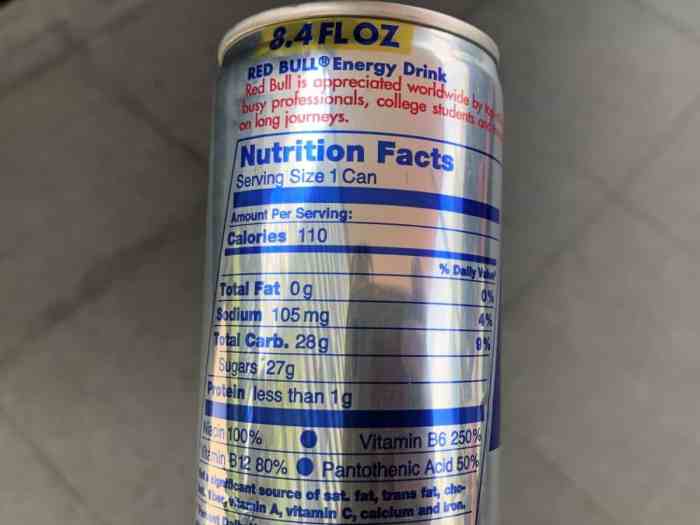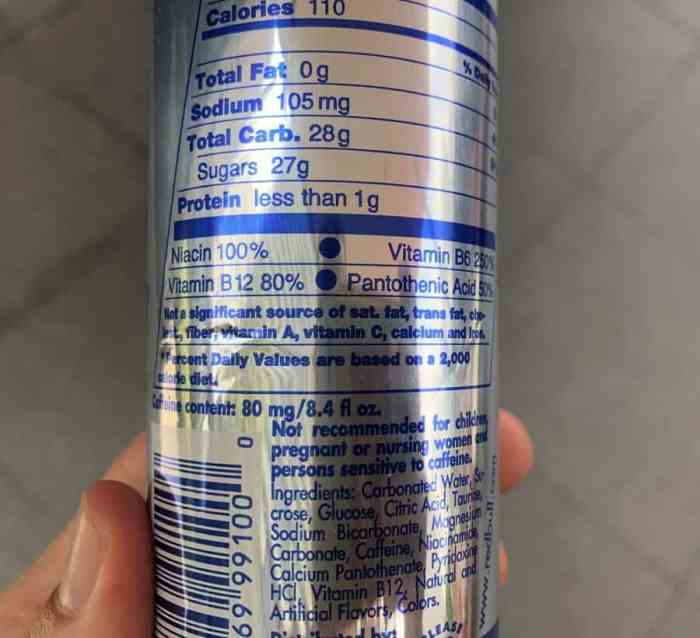Caffeine Content & Effects

Red bull nutrition facts 2024 – So, you’re stoked for a Red Bull, eh? Totally get it – that Bali sun can drain your energy faster than a Bintang at a beach party. But before you crack open that can, let’s chat about the caffeine inside. It’s the secret ingredient that gives you that
Red Bull’s 2024 nutritional information remains a point of interest for health-conscious consumers, especially concerning its high sugar content. For those seeking a lower-sugar alternative to accompany their Red Bull, consider the nutritional profile of other foods, such as checking out the detailed breakdown of flour tortilla nutrition facts for a potential pairing. Ultimately, understanding both Red Bull’s and other food’s nutritional values helps make informed dietary choices.
oomph*, but understanding its effects is key to enjoying it responsibly.
A standard 250ml can of Red Bull contains approximately 80mg of caffeine. That’s roughly the same amount as a cup of brewed coffee, although the exact amount can vary slightly depending on the bean type and brewing method. This level of caffeine can impact your body in various ways, both good and bad, depending on your individual sensitivity and consumption habits.
Caffeine’s Effects on the Body
The caffeine in Red Bull, like in other caffeinated beverages, acts as a stimulant. It affects your central nervous system, leading to a range of short-term and long-term effects. Understanding these effects is crucial for making informed choices about your consumption.
- Short-Term Effects: These are generally felt within 30-60 minutes of consumption and can include increased alertness, improved mood, enhanced focus, and a boosted metabolism. However, you might also experience jitters, anxiety, restlessness, and an increased heart rate. The intensity of these effects depends heavily on your individual tolerance and the amount consumed.
- Long-Term Effects: Regular, high consumption of caffeine can lead to a tolerance build-up, requiring more caffeine to achieve the same effect. Withdrawal symptoms like headaches and fatigue can occur if you suddenly stop consuming caffeine. Long-term, excessive caffeine intake has been linked to potential issues such as insomnia, digestive problems, and increased blood pressure in some individuals. It’s always best to moderate your intake.
Caffeine Content Comparison
Comparing Red Bull’s caffeine content to other popular beverages helps put things in perspective. While a single Red Bull (80mg) is comparable to a cup of coffee, other energy drinks can have significantly higher caffeine levels. Some energy drinks can pack a caffeine punch of over 200mg per serving. Even seemingly innocuous beverages like tea and chocolate contain caffeine, although usually in smaller amounts than coffee or energy drinks.
It’s always wise to check the nutrition label to understand your caffeine intake from various sources.
Sugar Content & Health Implications: Red Bull Nutrition Facts 2024

Hey, fellow wave riders! Let’s get stoked about something crucial: the sugar in your Red Bull. We’re all about that good-times energy, but let’s be mindful of what fuels our adventures. Knowing the sugar content and its impact is key to staying healthy and keeping those good vibes flowing.
Red Bull, that iconic energy drink, uses sucrose, a common table sugar, as its primary sweetener. A standard 250ml can packs a punch with approximately 27 grams of sugar. That’s about the equivalent of 6.75 teaspoons – more than many would consider a healthy daily intake. This high sugar content directly affects our teeth and overall well-being.
Dental Health Implications
That hefty sugar dose can wreak havoc on your pearly whites. Bacteria in your mouth feed on sugar, producing acids that erode tooth enamel, leading to cavities and, eventually, more serious dental issues. Regular consumption of high-sugar drinks like Red Bull significantly increases the risk of tooth decay and gum disease. Think of it like this: your smile is your best accessory in Bali, so let’s keep it dazzling!
Impact on Overall Well-being, Red bull nutrition facts 2024
Beyond dental health, excessive sugar intake is linked to a whole host of health problems. The high sugar content in Red Bull contributes to weight gain, increased risk of type 2 diabetes, heart disease, and even some types of cancer. The sugar rush you get initially is often followed by a crash, leaving you feeling sluggish and craving more sugar.
It’s a vicious cycle, my friends, and it’s not exactly conducive to catching those epic waves.
Sugar Content Comparison
Let’s put Red Bull’s sugar content into perspective by comparing it to other popular beverages. Remember, these values can vary slightly depending on serving size and specific product variations.
| Beverage | Serving Size (ml) | Sugar Content (grams) |
|---|---|---|
| Red Bull | 250 | 27 |
| Coca-Cola | 330 | 39 |
| Orange Juice (100% juice) | 240 | 24 |
| Apple Juice (100% juice) | 240 | 26 |
| Coconut Water | 330 | 9 |
Query Resolution
Does Red Bull contain artificial sweeteners?
No, Red Bull’s sweetness comes primarily from sucrose (sugar).
Are there different Red Bull formulations available (e.g., sugar-free)?
Yes, Red Bull offers sugar-free and zero-calorie variations.
How does Red Bull’s caffeine content compare to coffee?
A typical serving of Red Bull contains a similar amount of caffeine to a cup of brewed coffee, though the exact amount varies.
What are the potential long-term effects of consuming Red Bull regularly?
Regular high consumption may contribute to health issues related to high sugar and caffeine intake, such as weight gain, sleep disturbances, and dental problems. Consult a healthcare professional for personalized advice.


